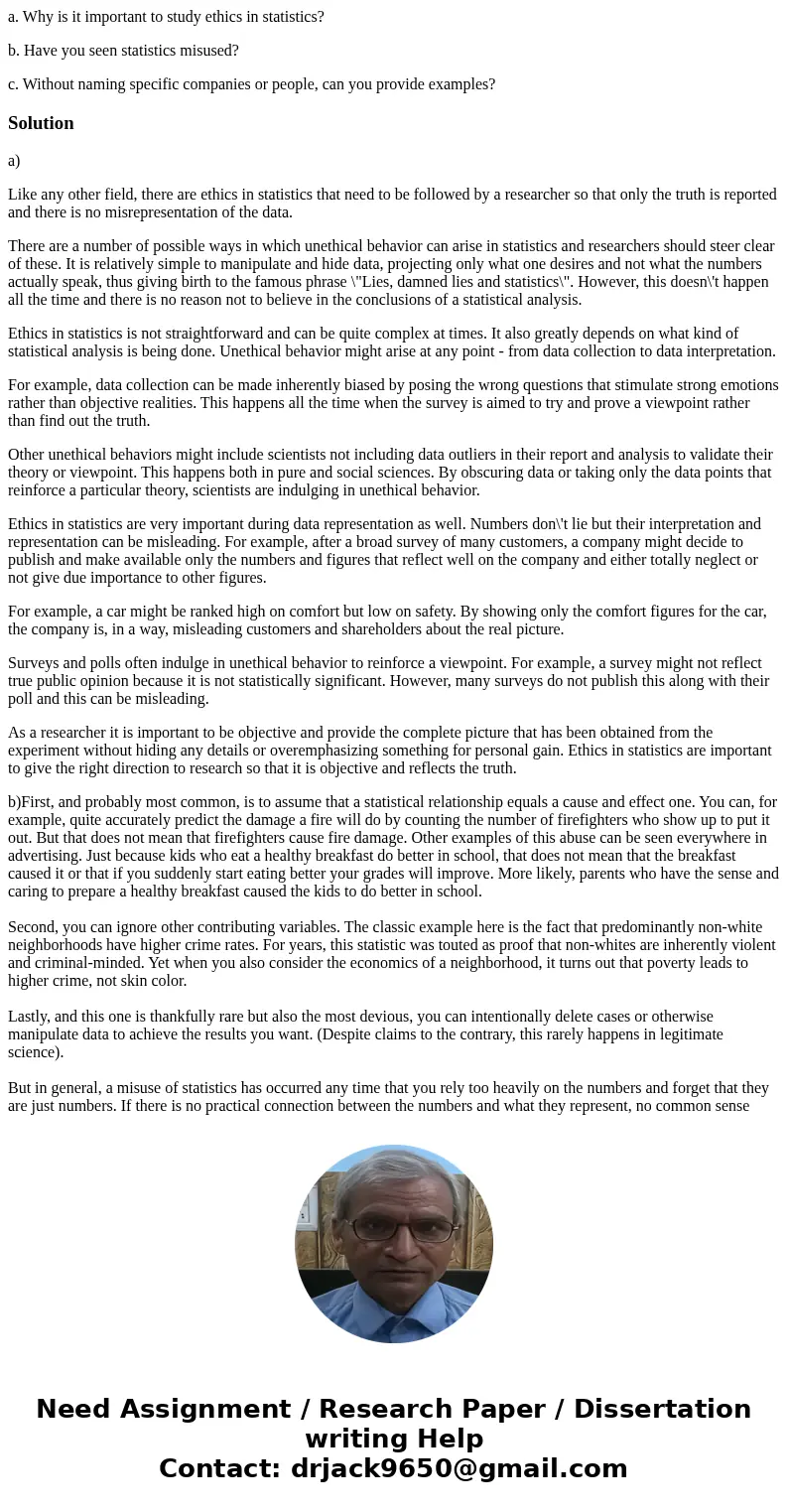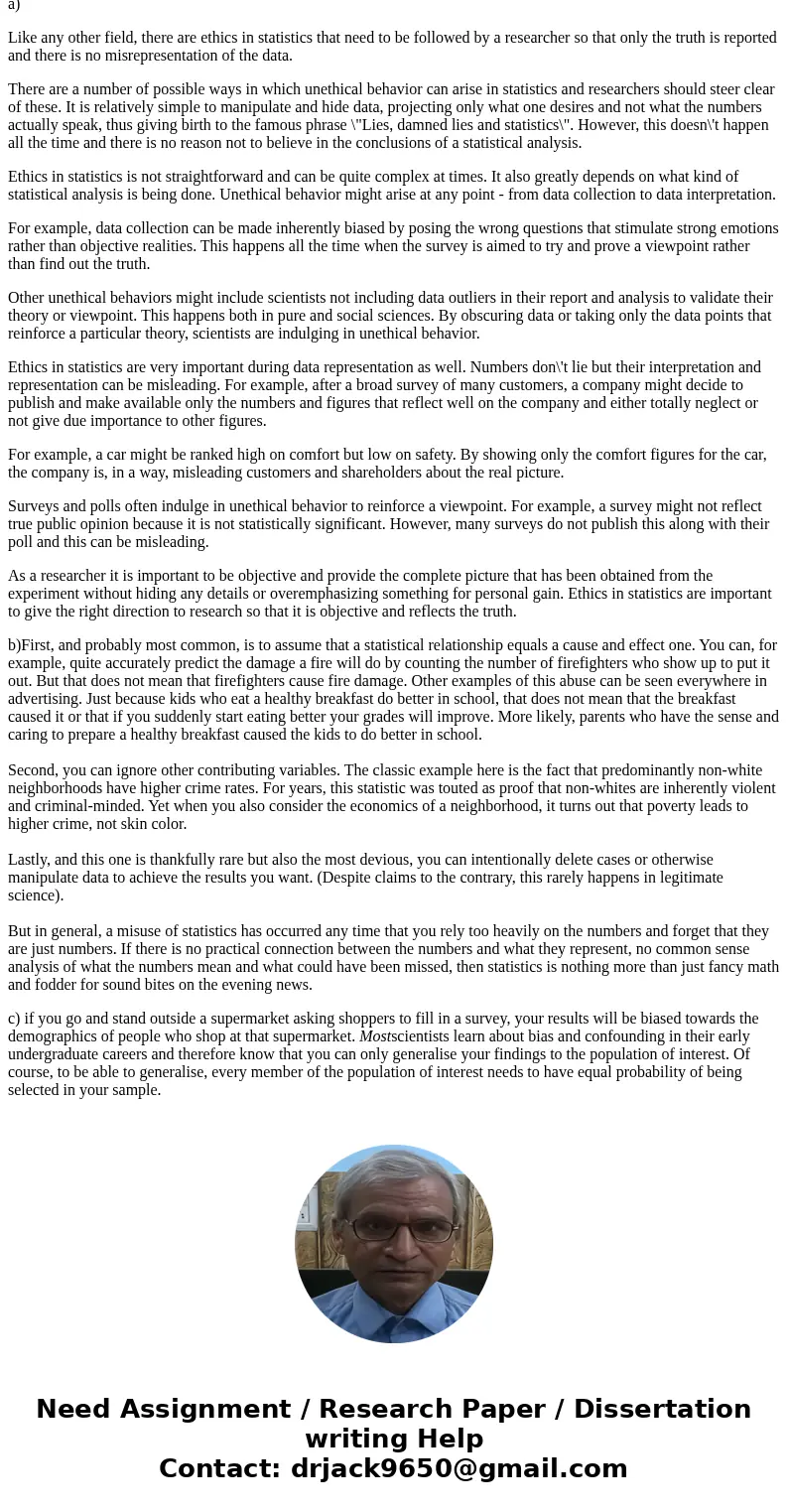a Why is it important to study ethics in statistics b Have y
a. Why is it important to study ethics in statistics?
b. Have you seen statistics misused?
c. Without naming specific companies or people, can you provide examples?
Solution
a)
Like any other field, there are ethics in statistics that need to be followed by a researcher so that only the truth is reported and there is no misrepresentation of the data.
There are a number of possible ways in which unethical behavior can arise in statistics and researchers should steer clear of these. It is relatively simple to manipulate and hide data, projecting only what one desires and not what the numbers actually speak, thus giving birth to the famous phrase \"Lies, damned lies and statistics\". However, this doesn\'t happen all the time and there is no reason not to believe in the conclusions of a statistical analysis.
Ethics in statistics is not straightforward and can be quite complex at times. It also greatly depends on what kind of statistical analysis is being done. Unethical behavior might arise at any point - from data collection to data interpretation.
For example, data collection can be made inherently biased by posing the wrong questions that stimulate strong emotions rather than objective realities. This happens all the time when the survey is aimed to try and prove a viewpoint rather than find out the truth.
Other unethical behaviors might include scientists not including data outliers in their report and analysis to validate their theory or viewpoint. This happens both in pure and social sciences. By obscuring data or taking only the data points that reinforce a particular theory, scientists are indulging in unethical behavior.
Ethics in statistics are very important during data representation as well. Numbers don\'t lie but their interpretation and representation can be misleading. For example, after a broad survey of many customers, a company might decide to publish and make available only the numbers and figures that reflect well on the company and either totally neglect or not give due importance to other figures.
For example, a car might be ranked high on comfort but low on safety. By showing only the comfort figures for the car, the company is, in a way, misleading customers and shareholders about the real picture.
Surveys and polls often indulge in unethical behavior to reinforce a viewpoint. For example, a survey might not reflect true public opinion because it is not statistically significant. However, many surveys do not publish this along with their poll and this can be misleading.
As a researcher it is important to be objective and provide the complete picture that has been obtained from the experiment without hiding any details or overemphasizing something for personal gain. Ethics in statistics are important to give the right direction to research so that it is objective and reflects the truth.
b)First, and probably most common, is to assume that a statistical relationship equals a cause and effect one. You can, for example, quite accurately predict the damage a fire will do by counting the number of firefighters who show up to put it out. But that does not mean that firefighters cause fire damage. Other examples of this abuse can be seen everywhere in advertising. Just because kids who eat a healthy breakfast do better in school, that does not mean that the breakfast caused it or that if you suddenly start eating better your grades will improve. More likely, parents who have the sense and caring to prepare a healthy breakfast caused the kids to do better in school.
Second, you can ignore other contributing variables. The classic example here is the fact that predominantly non-white neighborhoods have higher crime rates. For years, this statistic was touted as proof that non-whites are inherently violent and criminal-minded. Yet when you also consider the economics of a neighborhood, it turns out that poverty leads to higher crime, not skin color.
Lastly, and this one is thankfully rare but also the most devious, you can intentionally delete cases or otherwise manipulate data to achieve the results you want. (Despite claims to the contrary, this rarely happens in legitimate science).
But in general, a misuse of statistics has occurred any time that you rely too heavily on the numbers and forget that they are just numbers. If there is no practical connection between the numbers and what they represent, no common sense analysis of what the numbers mean and what could have been missed, then statistics is nothing more than just fancy math and fodder for sound bites on the evening news.
c) if you go and stand outside a supermarket asking shoppers to fill in a survey, your results will be biased towards the demographics of people who shop at that supermarket. Mostscientists learn about bias and confounding in their early undergraduate careers and therefore know that you can only generalise your findings to the population of interest. Of course, to be able to generalise, every member of the population of interest needs to have equal probability of being selected in your sample.


 Homework Sourse
Homework Sourse